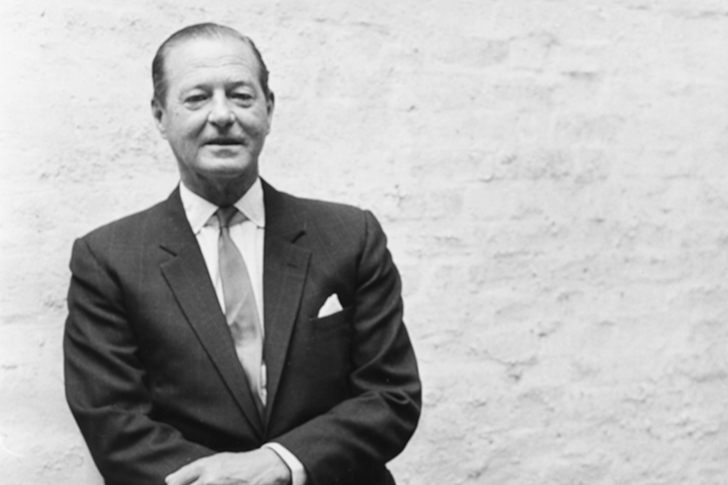It is often said that Terence Rattigan’s ‘thing’ was his homosexuality and that his disguising of it coloured everything he wrote. But he had, I think, another secret up his sleeve that is still little known. He was a tailgunner in the RAF. Indeed the service was his family and a thread of blue serge runs through his career. He died in 1977, aged 66.
After Harrow and Oxford, the war rudely interrupted his dazzling entrée as a dashing young Thirties playwright. After basic training, Rattigan was assigned as a wireless operator and airgunner to a squadron of Sunderlands, hunting enemy submarines in the Atlantic. One moment he was banking nice fat royalties from West End hits such as French Without Tears. Next thing he knew, he was patrolling the Atlantic on 13-hour missions, prey to long-range enemy aircraft looking for an easy target. Actually, the deep-bellied Sunderlands were, apparently, very hard to kill. The Germans called them ‘flying porcupines’ — the prickly spines being their ten machineguns. Rattigan manned the rear end.
His 1942 play Flare Path was so authentic that the manuscript practically had a bullet hole through it. He completed the first act during repairs after a Heinkel had shot up the tail end of his aircraft. Then, flying 1,200 miles on to West Africa, the starboard engine died. Luggage, loo seat and every fitting they could hack off with an axe went overboard in a desperate bid to stay aloft. Rattigan was about to sling his kitbag when he realised that his manuscript was in it. He ripped off the heavy cardboard covers but shoved the pages up his jacket. The Sunderland made it home with a few minutes’ fuel to spare. He finished the play on the verandah of the officers’ mess in Freetown. Within a few months it was a major West End hit, rippling with a British understatement that made Churchill blub.
Now another of his wartime plays is about to open, Love in Idleness, first produced in 1944. It’s not a uniformed play. Don’t expect a masterpiece or the drone of Lancaster bombers. But do expect an evocation of the period and its politics, plus a lot of witty banter. It’s about a rich industrialist meeting a young left-wing idealist and its cast features Anthony Head, Eve Best and Helen George. It is directed by Trevor Nunn, who staged Flare Path superbly a few years ago in the West End. It also follows on from a completely enjoyable Bath revival last year of Rattigan’s third wartime play, While the Sun Shines, a 1943 gas-mask comedy involving a Free French officer, an American soldier and a young English peer.
His war experience with a very tough squadron was hugely valuable to him. The chaps loved tail-end Terry for his kindness, his irreproachable manners and his professionalism. He appeared to have engine coolant in his veins, but later wrote of the hairier moments over the briny, ‘I was shitting myself along with everyone else.’
Flying features in his great masterpiece, The Deep Blue Sea, staged in 1952, about a woman who leaves her boring husband, a judge, to live a far more erotic life with a boozy, much-decorated Battle of Britain Spitfire pilot. Freddie Page — with his RAF slang and yearning for 1940 — was originally played by Kenneth More, who was a perfect fit what with his crinkly hair, golf clubs and breeziness. Page remains Rattigan’s greatest RAF character — but the stereotype of the selfish, drunken, post-war misfit is deepened by the playwright’s tender, comradely understanding.
Kenneth More, incidentally, always thought that his best job in the theatre was not playing Freddie Page, but being a stage hand among the nude girls at the Windmill Theatre. Instead of hunting enemy submarines, as he did in the navy, More used a peephole to scan men in the stalls who had newspapers concealing their laps and relayed their position. He’d whisper, ‘Wanker, Daily Mail, C17.’ Offenders would thenbe ejected.
By the mid-Fifties, Rattigan’s money-spinning career as purveyor of famous dramas such as The Winslow Boy, The Browning Version and Separate Tables had nosedived. He blamed the angry young playwrights and theatre critics for a nasty campaign of vilification against him. With his wealth, upper-class vowels and poofy cravats, he was non grata in a theatre world dominated by a new breed of hairy and hetero oiks. However, David Hare wrote a debunking essay arguing that this was tosh; that Rattigan was no martyr to anything, that he just went off, as writers do, and that the kitchen-sink brigade who supplanted his sort of ‘well-made’ theatre were kicked just as hard by the critics.
Whatever the case, it is good to see that the war-era plays of Flight Lieutenant Sir Terence Rattigan (Retired) — as he was entitled to call himself in later life (but didn’t) — are chocks away.






Comments